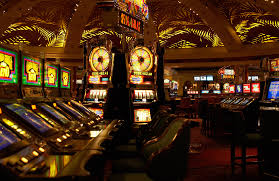
The casino industry in Pakistan has faced significant challenges in recent years, especially when compared to the rapidly growing markets of neighboring Asian countries. While Pakistan has made strides in the development of its gambling sector, it continues to struggle in keeping up with the booming casino and gaming industries in countries like India, Macau, and the Philippines. In this blog, we explore the hurdles faced by Pakistani casinos and what they can do to remain competitive in the highly competitive Asian market.
The Current Landscape of Pakistani Casinos
Gambling in Pakistan is legal but heavily regulated. The country has a few licensed casinos that cater to both local and international players. However, the market remains small and relatively underdeveloped compared to its neighbors. The lack of large-scale integrated resorts, limited marketing efforts, and outdated infrastructure are some of the primary reasons why Pakistani casinos are unable to match the appeal of those in nearby regions.
While there is potential for growth in the sector, several factors have held back the development of a fully-fledged casino market in Pakistan. One of the biggest challenges is the limited number of casinos and gaming establishments, with most being concentrated in a few cities. In contrast, neighboring countries boast large, world-class casino resorts that attract millions of tourists each year, positioning them as top destinations for gambling and entertainment.
The Strength of Neighboring Asian Markets
When comparing the casino industry in Pakistan with those of its neighbors, the differences become clear. Countries like India, Macau, and the Philippines have invested heavily in their gambling infrastructure, offering a wide range of experiences for both tourists and locals. These markets have set the bar high for what modern casinos can offer, from luxurious resorts to cutting-edge gaming technology, making it difficult for Pakistan to compete.
1. Macau: The Gambling Capital of Asia
Macau, known as the “gambling capital of the world,” is a prime example of a successful casino market. The city is home to some of the largest and most luxurious casinos globally, such as the Venetian Macao and Wynn Macau. These casinos offer a diverse range of gaming options, including slots, table games, and poker, alongside high-end shopping, entertainment, and dining options. Macau’s economy heavily relies on tourism, and its casinos play a vital role in attracting millions of visitors each year.
2. India: A Growing Market with Huge Potential
India is also emerging as a significant player in the Asian casino market, particularly in states like Goa, Sikkim, and Daman, where casino gaming is legalized. With a large, diverse population and an increasing middle class, India presents enormous potential for casino growth. The country is also witnessing a rise in online gambling, making it a key market for casino operators to target.
3. The Philippines: A Thriving Casino Destination
The Philippines has seen tremendous growth in its casino industry over the past decade. With the development of entertainment complexes such as Resorts World Manila and City of Dreams, the country has positioned itself as a premier gambling destination in Southeast Asia. The government has been proactive in promoting the casino industry, and tourism has played a central role in the growth of the market. The Philippines’ welcoming attitude toward gambling has made it an attractive option for both players and investors.
Key Challenges Faced by Pakistani Casinos
While neighboring countries have thrived in the casino business, Pakistani casinos have struggled with several key challenges that hinder their ability to compete effectively in the regional market.
1. Lack of Infrastructure and Investment
One of the primary reasons Pakistani casinos are struggling is the lack of infrastructure. The country’s casinos are often outdated and lack the modern amenities and luxury features found in casinos in Macau, India, and the Philippines. These countries have invested heavily in state-of-the-art gaming facilities, entertainment, and accommodation options that attract tourists, while Pakistan has yet to build comparable resorts or experiences.
2. Strict Regulations and Legal Challenges
Pakistan’s gambling laws are restrictive and complicated. Although a few casinos operate legally in the country, the strict regulations surrounding gambling have deterred potential investors. The legal environment is not as conducive to growth as in neighboring markets, where casinos benefit from clearer and more investor-friendly regulations.
3. Limited Marketing and Brand Recognition
Another challenge is the limited marketing efforts made by Pakistani casinos. While neighboring markets aggressively promote their casinos through global marketing campaigns, media partnerships, and sponsorships, Pakistani casinos have struggled to gain international recognition. This lack of visibility makes it harder to attract tourists and international players who are looking for exciting casino experiences abroad.
4. Cultural and Religious Considerations
Gambling in Pakistan faces cultural and religious opposition, as the practice is seen by many as unethical. This societal stance makes it difficult to promote casinos as mainstream entertainment options, which, in turn, limits the growth of the market. Neighboring countries do not face the same level of opposition, allowing their casino industries to flourish without such significant social barriers.
What Needs to Change for Pakistani Casinos to Compete
To compete with the thriving casino markets in neighboring Asian countries, Pakistan’s casinos need to address several key areas.
1. Investment in Infrastructure
For Pakistani casinos to remain competitive, significant investments in infrastructure are needed. Developing world-class casino resorts that offer luxury accommodations, high-end dining, and entertainment options will attract both domestic and international tourists. Integrating technology into the gaming experience will also make Pakistani casinos more appealing to the modern gambler.
2. Easing Regulations
Relaxing some of the stringent regulations around gambling would allow more operators to enter the market, driving competition and innovation. A more transparent and streamlined regulatory process would make it easier for foreign investors to set up casinos in Pakistan, bringing much-needed capital and expertise into the sector.
3. Promoting Responsible Gambling
Pakistan can also take a proactive approach in promoting responsible gambling practices. By offering better protection for players and establishing clear guidelines on gambling behaviors, the country can enhance the reputation of its casinos as safe and responsible places to gamble.
4. Better Marketing Strategies
Pakistani casinos must step up their marketing efforts to make their casinos more visible on the global stage. Effective advertising campaigns, partnerships with international brands, and participation in global casino events can increase Pakistan’s presence in the international gambling market.
Conclusion
While Pakistan’s casino industry holds potential, it currently faces significant hurdles when competing with the booming casino markets in neighboring Asian countries. To remain relevant, Pakistan needs to invest in its infrastructure, ease regulatory restrictions, and enhance its marketing strategies. With the right changes, Pakistan could position itself as a competitive player in the growing Asian gambling market. However, it will require time, effort, and collaboration between the government, investors, and casino operators to overcome the challenges and create a more vibrant, successful gambling sector.
Unlock Big Wins with Top Casino Games at KKClub.pk


